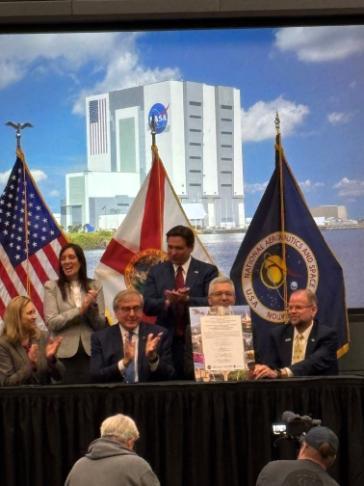NASA’s Kennedy Space Center and Florida universities unite to propel space exploration
NASA’s Kennedy Space Center in Florida is entering a new era of collaboration that will propel the nation’s space exploration by leveraging the world-class expertise at three Florida universities. As outlined in a memorandum of understanding signed Wednesday, the institutions will provide critical research and development support for NASA’s Moon to Mars Initiative, which aims to advance human presence and exploration throughout the solar system.

University of Florida, University of Central Florida and Embry-Riddle Aeronautical University are the charter members of the Florida University Space Research Consortium, designated in 2024 as the state’s official space research entity. Officials from those schools alongside NASA leaders and other distinguished guests participated in the signing ceremony held at Kennedy, marking a critical milestone in a one-of-a-kind partnership to advance research, technology development, education, and communication between the spaceport and the state’s growing space industry.
“Through this agreement, NASA will benefit in new and exciting ways from our longtime partnership with the universities that make Florida shine,” said NASA Administrator Bill Nelson. “As we move deeper into this golden era of space exploration, a new generation of thinkers and leaders will lead the way – thinkers and leaders like the researchers, faculty, and students of the Artemis Generation, whom we are pleased to work with through the consortium.”
The creation of the consortium was the result of more than a year of effort by agency and university leaders, with the agreement serving as the official start of partnering activities. Florida is the only state with a university consortium affiliated with one of NASA’s centers.
Present at the event was Florida Gov. Ron DeSantis. “It was great to visit the Space Coast Jan. 8 to announce the Florida University Space Research Consortium — our state’s official space research entity. Home to a thriving aerospace industry and world-class higher education institutions, Florida is the ideal place to launch this initiative. We are primed to lead the nation in developing a blueprint for state-space partnerships into the future.”
The mission of the consortium is to foster a symbiotic relationship between NASA Kennedy and Florida’s universities to drive innovation in space exploration, research, and technology through academic collaboration, joint projects, and workforce development.
“The launch of the Florida University Space Research Consortium is a significant milestone for our state’s aerospace sector, bringing together our world-class education system with cutting edge research and development,” said Lt. Gov. Jeanette Nuñez. “This consortium will undoubtedly further strengthen and deepen Florida’s position as the leader in the global aerospace economy.”
The memorandum of understanding marks the dawn of a new era of cooperation between the Florida spaceport and the state’s university system. NASA plans to expand beyond the three charter universities to other state universities interested in participating. The push to enhance research and technological collaboration with universities has been a priority at NASA for years and has seen success at other NASA centers across the country.
“This agreement is a shining example of what it looks like when we link arms and create a space for the whole to be greater than all our parts,” said Janet Petro, Kennedy Space Center director and a signatory on the agreement. “This symbiotic partnership makes way for collaborative research opportunities and increased exposure to advanced technology, significantly enhancing NASA’s research output in fields such as aerospace engineering, materials science, robotics, and environmental science, all of which are necessary for long-term human exploration as we learn to live and work deeper into space than ever before.”
The agreement is also a significant milestone for the UF Astraeus Space Institute, which launched in 2024 and is bringing together researchers from across the university, as well as world-class leaders in space science and technology, to promote human capabilities in space mission innovation.
“Florida’s universities have long been prodigious sources of talent, skill and audacious thinking,” said Mori Hosseini, chair of UF’s Board of Trustees. “This consortium is a perfect way to harness those assets to help lift the great state of Florida and our nation in their quest to keep us at the forefront of space exploration and advance America’s global leadership.”
UF President Kent Fuchs said, “Looking to the future, our students and faculty will benefit from the opportunities this new consortium promises. We will give back by generating new discoveries and new technologies, growing Florida’s high-skill, high-wage workforce, and nurturing industry partnerships. We look forward to the time when Florida’s other universities join the consortium, providing an even broader base of support and talent.”
UF Vice President for Research David Norton said, “UF and other universities within the state of Florida have long been leaders in space research and workforce development. This agreement between Kennedy and our universities will greatly accelerate the prominence of Florida university research and development, forging opportunities as we advance the state and nation in space exploration, defense, and industry through collaborative research.”
